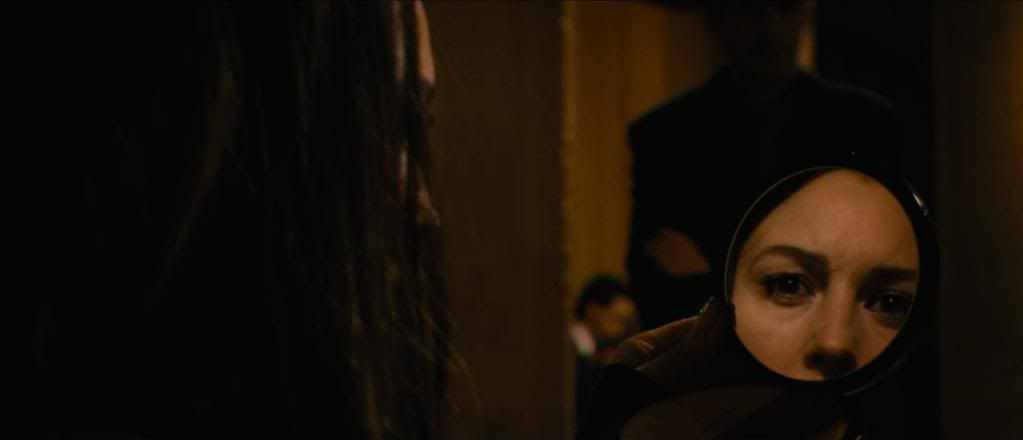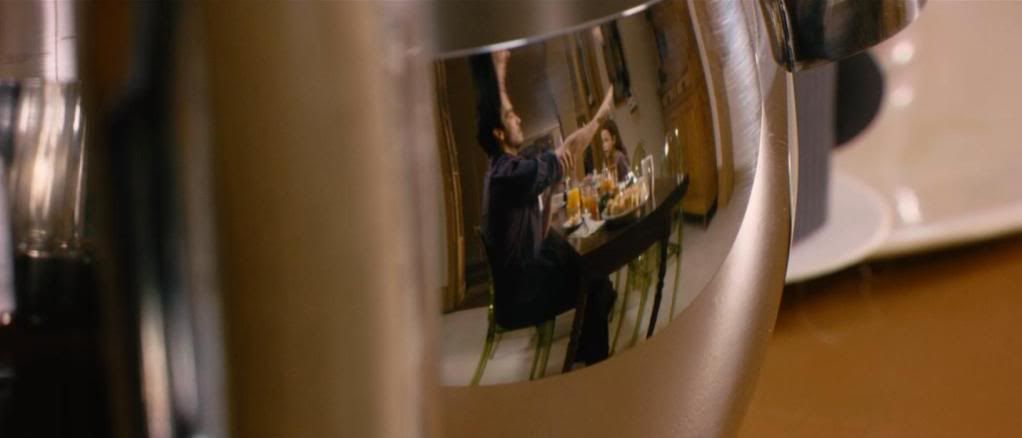

Marina de Van's In My Skin was a brilliant, unsettling, utterly unique psychological horror film, a study of a woman's disassociation from her body, her life, and the people around her. De Van's belated follow-up, Don't Look Back, explores similar themes, albeit in a less extreme form. Where the earlier film explored the grisly, bloody consequences of its subject's mysterious psychological break, Don't Look Back is a far more conventional film, a taut and intriguing puzzle-box movie that ultimately reveals its secrets in a way that the ambiguous, genuinely provocative In My Skin never did. This means that this follow-up lacks the head-rattling intensity and discomfitting ambiguity of In My Skin, but though it's a far more traditional film, it's still a very compelling one.
Based on these two films, De Van's key theme seems to be the fragility of the individual's conception of reality. Jeanne (Sophie Marceau) is a writer, married to Teo (Andrea di Stefano), with two children. She's successful and seemingly happy, but she has one curious gap in her life: she was in an accident at the age of 8 and can't remember anything about her childhood before that point. In order to probe that absence, she's writing a book about childhood, using photographs and information provided by her mother. This investigation into her past seems to trigger something in her mind, and her world begins slipping away from around her. At first, she starts noticing tiny changes, things being moved around in her apartment, little details shifting in her surroundings and in the people she loves. The changes quickly become more dramatic, until she no longer even recognizes her husband and her children as the same family she's lived with before this point. Her husband morphs into a different man (played now by Thierry Neuvic) and soon she's noticing the same changes in herself as well.
These changes enter her life through media at first, through photos and movies. She goes to see a movie with Teo and afterwards, describing the plot to friends, they seem to have seen different films, with her description of a mind-bending psychological thriller mirroring her own destabilizing experiences. She watches a home movie of her family and sees all of them, including herself, as different people. Marceau's Jeanne is slowly replaced by a second iteration of the character, played by Monica Bellucci, using disturbing digital effects that mash the two women's faces together, creating a hybrid Jeanne who's seemingly being torn apart from inside, losing her sense of reality. Her whole world changes around her, and no one else seems to notice a thing; they all insist that things have always been this way.


The parallels to In My Skin are obvious, right down to the scar on Jeanne's leg from her mysterious childhood accident, mirroring the leg wound that triggered the protagonist's derangement in the earlier film. For De Van, the fragility of the body is akin to the fragility of the mind, and physicality is intimately linked with perceptual cues that exist only in the mind. Photos, movies, even mirrors, can lie and distort as easily as they can tell the truth, and De Van packs the film with mirrors, which cast reflections that are by no means reliable. Jeanne is always checking herself in mirrors; during the opening credits, she goes through her morning rituals in a bathroom where there are countless tiny mirrors in which random body parts and details are visible, but seemingly no larger mirrors in which the whole person, the whole body, can be seen at once. At the film's climax, when Jeanne (now embodied almost entirely by Bellucci) goes to Italy to investigate her childhood and the source of her slipping identity, she stands in front of a curiously distorted mirror that seems to be pulling at her face from the edges, as though trying to split her off into two, creating this warped second person growing out of her like a tumor.
There's a definite Cronenbergian bodily transformation subcurrent to the film, though it's mostly toned-down in comparison to the far more gruesome In My Skin. De Van employs skewed horror movie angles and creepy music to dramatize what is essentially an entirely mental drama. At its climax, though, the film's mental trauma explodes to the surface, with Jeanne's body twisted and distorted until she's stumbling frantically towards a confrontation with her past, her body betraying her, her flesh warping into unfamiliar forms. At the root of this psychological breakdown is childhood, which for Jeanne has always been a blank spot, a fracture in her identity that's only now being felt — an element that links this film in interesting ways to the films of Jean Rollin, particularly his Lips of Blood, another film about childhood amnesia and fragmented identity.
Don't Look Back ultimately resolves its mystery with some scenes of exposition that neatly, perhaps too neatly, make sense of the film's plot. The puzzle is solved, the instability of reality is explained away, and things are restored to normality, though not without a perverse final note of lingering ambiguity about identity in the sunny final scenes. The film resolves into a rather traditional psychological thriller with a mystery that, once solved, isn't especially interesting on its own merits. What's fascinating about this film, like De Van's earlier film, is the sense of just how easy it is for reality to simply shift, for the world to suddenly and without warning fall away, revealing something very different from the familiar reality one had known previously.

3 comments:
Well, I do like IN YOUR SKIN quite a bit, but still have not seen this follow-up Ed. Again a brilliant piece, broaching the style and themes prevelent in the earlier film.
This sounds great, the only drawback being that's its quite close in concept to an idea for a movie I had last year albeit with some different emphasis. But I guess Kafka and Dostoevsky went there before anyone. I liked In My Skin, but I recall being even more impressed by another short film on the DVD, whose name escapes me (same is true of the George Washington DVD; I was more taken with Personal Pinball than the feature.
Thanks, guys. I didn't like this as much as In My Skin - which is absolutely brilliant in my book - but it's still quite interesting and worth seeing. I'll have to track down some of de Van's shorts, too, I don't think I realized they were on the In My Skin DVD when I rented it.
Post a Comment